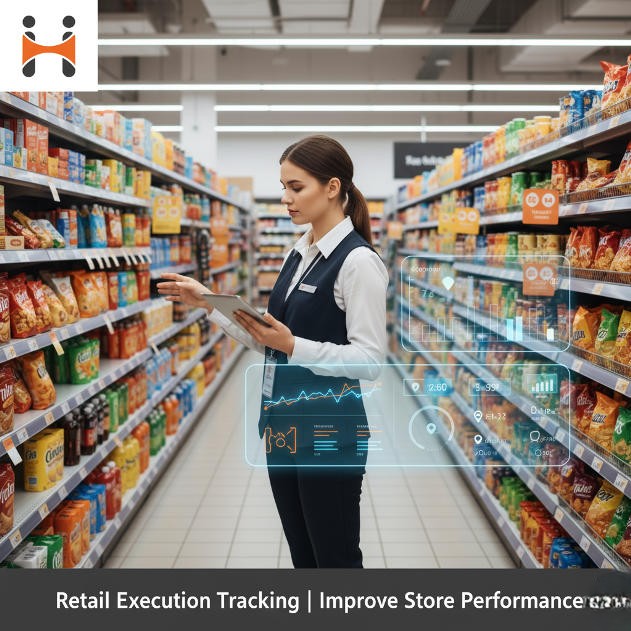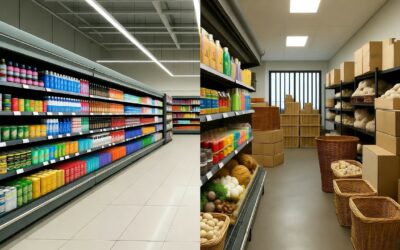Retail Execution Tracking: The Key to Success in Modern Trade Stores

Modern Trade has changed how FMCG companies sell. Organized retail outlets, supermarkets, and hypermarkets now hold a large share of sales, especially in cities. These stores give brands better visibility but also bring new challenges. Shelf space is limited, competition is high, and execution must be perfect.
Retail execution tracking helps companies manage all this. It ensures that the right products are available, displayed, and promoted as planned. For FMCG companies, strong execution means more sales, better brand visibility, and smoother operations.
At our company, we have seen how tracking tools help sales teams work smarter. They make it easier to monitor store activities and collect data from the field in real time.
What Retail Execution Means in Modern Trade?
Retail execution means how well a brand’s plans are carried out in stores. It covers everything from stock levels and shelf placement to pricing and promotions.
When field reps visit stores, they check displays, talk to store managers, and record sales activity. But without a clear system, many small details go unnoticed. That’s where tracking software helps. It connects field teams, managers, and distributors through one system that updates automatically.
This gives everyone a live view of what’s happening in stores. Managers can see which outlets have stockouts, which displays are missing, and which promotions are performing well.
Why Retail Execution Tracking Matters?
1. Visibility across stores
Modern Trade networks are large. A single company might have products in hundreds of outlets. Without tracking, managers rely on manual reports that come in late and are often incomplete.
Tracking software gives instant updates. Reps can upload photos, scan barcodes, and record issues from their phones. Managers can view all store activities in real time. This improves decision-making and helps fix problems faster.
2. Better stock and display management
One of the biggest challenges in Modern Trade is keeping shelves full. Stockouts lead to missed sales and unhappy customers.
Execution tracking tools show live stock data. Managers can see when a store is running low and alert distributors before products go out of stock. They can also track shelf space and make sure displays follow planograms -the visual layout that decides how products are placed.
3. Stronger brand presence
When displays are maintained well, the brand looks more consistent. Regular audits and photo-based reports help ensure that all stores follow brand guidelines. Promotions run on time, and products look fresh and well-placed.
4. Real performance tracking
Every visit, task, and photo becomes a data point. Over time, this builds a clear picture of performance. Managers can compare stores, track rep efficiency, and identify gaps in execution.
This helps teams focus on what matters most – improving sales through better in-store activity.
What Happens Without Retail Execution Tracking?
Without a proper system, execution becomes guesswork. Reps might forget to report small issues. Managers lose time chasing updates through calls or WhatsApp. Promotions are delayed because reports arrive late.
We’ve seen this happen in companies that relied only on manual checklists. When we introduced tracking software, the difference was clear. Reports came in on time. Managers got real photos instead of written notes. Stockouts dropped, and promotions ran more smoothly.
Data replaced assumptions.
How Tracking Software Works?
Retail execution tools bring all retail activities onto one digital platform. Every sales rep has a mobile app. Every manager gets a dashboard.
When a rep visits a store, they check in using GPS. They take photos of shelves, record stock details, note issues, and submit everything through the app. The data appears instantly on the manager’s dashboard.
Common features include:
- GPS check-ins to confirm visits
- Photo capture to verify displays and promotions
- Real-time stock reporting
- Task assignment and follow-ups
- Performance reports for outlets and reps
This setup makes work transparent and easy to monitor.
Benefits for FMCG Companies
1. Better coverage and planning
Managers can track which stores are visited regularly and which are missed. They can plan beats and schedules more efficiently. This helps cover more outlets without increasing workload.
2. Faster issue resolution
When reps report a problem, managers see it instantly. They can respond immediately and send instructions to fix it. This keeps store operations smooth.
3. Reliable data for decision-making
Because reports come directly from the field with photos and GPS proof, they’re accurate. Managers can trust the numbers and use them to plan better strategies.
4. Stronger team accountability
Every rep’s performance is recorded automatically. Managers can see who is performing well and who needs support. It encourages discipline and consistency in the field.
5. Improved sales and visibility
When products are always in stock and promotions run on time, sales increase. The brand gets better exposure, and customers find what they want easily.
Personal Experience from the Field
We worked with an FMCG company that sold packaged foods across large supermarket chains. Their main issue was poor visibility on store execution. Reports came in two days late, and many photos were missing.
After using retail execution tracking software, the team started reporting in real time. Managers could see which stores had missing displays or expired promotions. Reps could raise issues immediately through the app.
Within two months, stockouts fell by 30 percent. In-store visibility improved. Sales went up because products were always available and displays stayed fresh.
The team said it became easier to plan their visits. Managers spent less time following up and more time coaching their teams.
Common Mistakes to Avoid
Some companies fail to get results because of a few simple mistakes.
- They treat tracking as a one-time setup instead of a daily process.
- They ignore the data collected and rely only on reports.
- They don’t train field reps properly on using the app.
- They skip regular reviews and updates.
To make tracking effective, it needs constant use and attention. Data must turn into action
How Technology is Shaping Retail Execution?
Technology has made retail execution faster and more accurate. Modern systems use GPS, AI, and analytics to simplify store operations.
AI can help detect missing products from photos. Predictive analytics can show which stores are likely to run out of stock soon. Mobile apps now work even in offline mode, which helps reps in areas with poor internet.
The result is less manual work and fewer delays.
When connected with other tools like CRM or Distributor Management Systems, retail execution tracking gives a full picture of how the brand performs – from warehouse to shelf.
What’s Next for FMCG Companies?
Retail execution will keep evolving as Modern Trade expands. In the future, systems may connect directly with POS (Point of Sale) data to show real-time sales. They might suggest which stores need extra stock or where a promotion will perform best.
For FMCG companies, this means better forecasting and smarter operations. Every store visit will be planned for impact. Every display will serve a purpose.
At our company, we help businesses set up retail execution tracking systems that make store visits meaningful. With real-time updates, performance insights, and automated reports, teams gain control over their field operations.
If your goal is to improve visibility, boost sales, and manage your retail network efficiently, retail execution tracking is a step in the right direction. Take control of your in-store execution today. Schedule a demo to see how our retail tracking solution can transform your Modern Trade performance.


